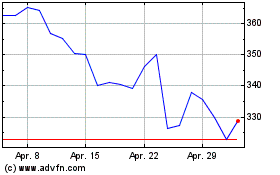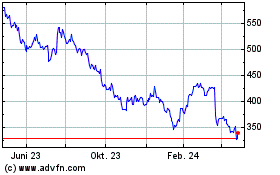Gucci Launches Circularity Hub as Fashion Sustainability Regulation Looms
21 Februar 2023 - 11:19AM
Dow Jones News
By Joshua Kirby
Luxury brand Gucci is to launch a hub promoting circular fashion
in Italy as it looks to anticipate European regulation forcing
firms to limit the environmental impact of their operations.
The "circular hub" will aim to boost transformation in the
Italian fashion industry's production models, Gucci, which is owned
by French luxury-goods group Kering, said. This will entail coming
up with new solutions to boost circularity, from raw materials and
design to production and logistics, the fashion house said. A
research-and-development center will study ways to improve
circularity, including through better durability and recyclability
of products, as well as minimizing waste and pollution.
Kering didn't set out the expected extent of the hub's
environmental benefits, but said it should promote the use of fewer
natural resources and reduce emissions of the greenhouse gases that
contribute to the heating of the planet. An initial estimate
suggests, for example, that the hub could cut the emissions from
managing waste generated by Gucci's leather-goods production by up
to 60%, Kering said.
Based in Gucci's home region in Tuscany, the hub will involve
all Kering facilities in the region, including Gucci's production
sites and Italian suppliers of raw materials, as well as producers
of finished products. The hub's activities will later be extended
to Kering's other brands, before opening to the wider fashion
sector.
The group is applying for funding from the Italian government
for the initiative, it said.
"The fashion industry needs to accelerate and launch serious
actions to catalyze deep change, rethinking the way we produce and
use resources as well," Kering's Chief Sustainability Officer
Marie-Claire Daveu said.
"The creation of our circular hub represents a milestone that
goes in this direction," Ms. Daveu said, adding that Italy was a
good place to launch the hub since the country is home to some of
Kering's most renowned production and expertise.
The hub should act as a forerunner for new models that will be
made obligatory by European regulations in the coming years, Kering
said. Last year, the European Union set out a plan to reduce the
environmental damage of the apparel industry, a major contributor
to global emissions.
Clothing should be "long-lived and recyclable, and to a great
extent made of recycled fibers," the bloc said in its plan, while
labeling should make it easier for consumers to gauge the impact of
what they buy. New regulations will be formulated to enforce the
measures over the coming years.
Some countries are moving faster than others. France has
introduced a law obliging retail firms to make clear to consumers
the environmental impact of their products, including the amount of
recycled material, the use of renewable energy in their production
and their recyclability. The regulation applies to larger companies
with annual revenue above 50 million euros ($53.4 million) from the
beginning of 2023 and will be applied to smaller players from next
year.
The hub isn't the first time that Kering has taken the lead on
sustainability. In 2019, a fashion pact was presented by group
Chief Executive Francois-Henri Pinault, setting out targets for
lower environmental impact across the industry, including alignment
with the United Nations' targets on reaching net-zero carbon
emissions by 2050. Members of the pact include Kering's luxury
peers Prada SpA and France's Chanel, as well as fast-fashion firms
such as Spain's Inditex and sportswear brands such as Germany's
Adidas AG and Puma SE.
Write to Joshua Kirby at joshua.kirby@wsj.com;
@joshualeokirby
(END) Dow Jones Newswires
February 21, 2023 05:04 ET (10:04 GMT)
Copyright (c) 2023 Dow Jones & Company, Inc.
Kering (EU:KER)
Historical Stock Chart
Von Mär 2024 bis Apr 2024

Kering (EU:KER)
Historical Stock Chart
Von Apr 2023 bis Apr 2024
